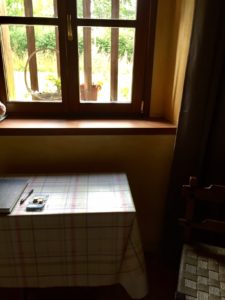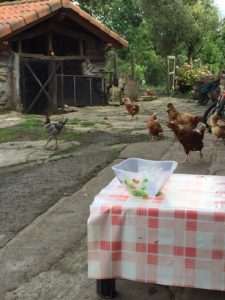the family home
would you sell your house
to find
your home in the world?
No longer following my guidebook explicitly, I had split the trek from Gernika to Bilbao, with two evening options for albergues midway. And yet, at about 2pm, I came over a rise and found a dream I did not want to leave.
Tiny preschool chairs were arranged at low tables in the wide stone driveway of an old stone farmhouse. At one table, a small red sign called out, “Beds for Rent!” and at another, “Albergue! Peregrinos welcome.” Two equally tiny dogs barked as I paused. I started to walk on, but intrigued, approached the house instead.
“Hola!” I hollered into the central patio of the home. A voice called indistinctly as the dogs continued to bark, their tales now wagging ferociously. I tried again: “Hola!” Voices rose inside, and a young boy ran out. I asked if he spoke English, and he said yes. I asked about the beds, and he ran back inside. Out came another boy, slightly older, who politely showed me inside to two hostel-style rooms added to the old house, or crafted from it. Tidy bunks, sturdy platform beds, even a low cot; one room had its own sink – and small writing table. I was enchanted.
 A white-haired grandmother slowly inched out of the door with her aluminum walker, her back bent painfully into a tight C-curve, one hand and wrist twisted into itself, wrapped in an elastic bandage. I greeted her in Spanish, but it sounded as if she spoke only Basque.
A white-haired grandmother slowly inched out of the door with her aluminum walker, her back bent painfully into a tight C-curve, one hand and wrist twisted into itself, wrapped in an elastic bandage. I greeted her in Spanish, but it sounded as if she spoke only Basque.
My little host was 8-year-old Martín, and he and 10-year-old Ander called their mother on the cell phone. She quoted me the same prices I had gotten from Martín, and so for the full 28 euros I got a clean bed in a rustic farmhouse, a long hot shower, a multi-course homemade dinner with wine and rich conversation, a full breakfast the next day, and best of all, the chance to meet Marisa and Gaizka, the married couple whose home and fledgling albergue I had chanced upon.
While we waited for Marisa to get home, I showed the grandmother photos on my phone of my grandchildren. When I showed her one baby’s funny expression and called him “La Tortuga,” The Turtle, we both laughed out loud. “Guapo,” she added softly, granting him handsome beauty as if she had waved a fairy godmother’s wand.
I spent my afternoon writing, sitting out front as the boys played in a hammock. Grandmother scattered corn for the chickens strutting through the yard; the gray-and-white dog snuggled up next to me to nap. The warm sun peaked in and out of clouds that gathered as the day wore on.
After a couple hours, two peregrinos I had met, Pauline and Antoine of Holland, arrived and were offered fruit and rest by our junior hospitaleros, as Marisa had returned only to leave again on another errand. I greeted the couple enthusiastically, and they asked if they could join me at my tiny table.
Antoine and Pauline were gray-haired, somewhere in their sixties, I guessed. They were celebrating 1000 km already, having started their Camino much farther back in Europe. Much farther back in years, too, I thought to myself, looking at their ease and kindness with each other.
Luckily for me, Antoine’s feet were tired. Extolling the glories of my oasis among the chickens, I had them curious, and so I showed them the two rooms. Marisa arrived back home and I made introductions; she excitedly thanked me for bringing in these two friends, who had, upon seeing the accommodations, immediately said “Yes!” and taken off their boots.
As she prepared a special salad for our meal, Marisa and I talked about the struggles of a mother at home with not two but three boys – there was also 3-year-old Gorka. She treated me like family, by turns confiding worries and taking courage, and we planned writing letters to each other to continue our chummy talks. At all praise for our beautiful clean rooms, Marisa shrugged off my words with, “It is just a house. It is only a house.” But what a house. She told me with obvious affection that this farmhouse was passed to her from her mother who lived with them, and from her mother, and back over 300 years. It was timberframe, stone, and plaster, and the feeling of it was simply: home. Textured walls painted warm colors embraced our travelers’ exhaustion in welcome, as deep windows framed the Camino out front, the garden with its apple and pear trees, flowers everywhere, and the far mountains beyond, encouraging us to continue our journey.
In the evening, we all sat at a long wooden table under growling skies that never rained, talking relationships, home, work, politics, purpose, and the value of taking the Camino slowly. Gaizka joined us after dinner for tea, teaching us about Basque history and culture. He explained that the Basque people are proud, strong and independent, fearless risk-takers, famous as sailors, navigators, athletes, and bullfighters. His children learned Basque first, then English and Spanish, at school; Basque was spoken at home. I learned that the tree I visited in Gernika (the Basque version of the city’s name) was the most significant symbol of Basque culture I could have chosen to see. Under this tree, the Basque chieftans and lords had met to make agreements and keep peace through their long history; the tree was the witness to their oaths, binding generations to their words as it continued to live on.
Gaizka’s Basque heritage showed through as he passionately told how Marisa’s mother was a child in 1937 when Franco had Hitler bomb Gernika during the Spanish Civil War – and Grandmother still remembered it. This would make her somewhere around 84 now. Pauline was a child psychologist, Antoine was retired, and I had just quit my long career as a caseworker with homeless people, so we immediately fell into conversation about the human costs of such intense experiences. Just as quickly, we caught ourselves, relieved at being a step removed on the Camino, not working for the moment with all the trauma of the world. And so we bonded over caring, and having chosen work that let us directly care about the suffering of others. We became friends in one night.
We understood, deeply, the need for a safe and loving home. I did not share how deeply I personally understood this, how profoundly unsafe I had felt at home as a child, for far too many years. How I resonated with grandmother’s childhood experience of bombs dropping, of chaos and the hopelessness of wanton destruction. Instead, we celebrated finding this sweetest of family homes, standing solid and strong over the generations, unshaken by the world around it.
At 2am, I woke to use the bathroom. As I tiptoed through the dark past the kitchen, I saw a soft glow, and there stood Marisa, damp curls encircling her face, busy near the warm oven. She had baked us bizcocho, a dense, moist coffee cake, for breakfast in the morning. I hugged her and we laughed in whispers that she would go to bed soon – and sleep in, late, while we all shouldered our packs with the first light.
The moon hung full and bright through wispy blowing clouds high over the Basque mountains as I snuck back to bed. A huge tree grew at the edge of the property, outlined clearly in the night’s soft light. It reminded me of the great tree of Bizkaia, of these people, this family. It endured; they endured. In Norse legends, the creation myths of my own ancestors included the Great Tree of Life, Yggdrasil. It embodied the very universe. What is done to the tree is done to us all. We are all family.
This was my dream for travel in Europe, for the Camino: this gift of warm friendship and loving kindness, of being welcomed into people’s homes and lives as I traveled through. Touched, I realized in how many ways I felt fed and nourished. Safe. To be myself.
I belonged, where I was, in that moment. I was home. I was so overjoyed I could not sleep, and contentedly watched the moon through the window of my bedroom, occasionally wiping a happy tear or two from my eyes. I fell asleep smiling, here in a foreign place I had never seen, but had always been searching for.
